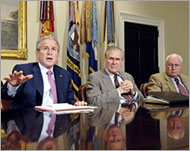Pentagon unit to push US message
The US defence department is setting up a special unit aimed at influencing 24-hour news outlets and websites around the world to counter what it considers derogatory publicity, according to a memo.

The Pentagon plans to focus more of its resources on so-called new media, such as the internet and web logs, or blogs under the scheme.
It would also include new workers to book civilian and military guests on television and radio shows.
In a memo obtained by The Associated Press, Dorrance Smith, assistant secretary of defence for public affairs, said news teams of people will “develop messages” for the 24-hour news cycle and “correct the record”.
The Pentagon plan has been under development for months and comes as US voters prepare to vote next week with the war in Iraq as a major issue to decide whether the Republicans continue their control of Congress.
Programme cost
Eric Ruff, the Pentagon press secretary, did not provide the number of people to be hired or the programme’s cost.
He denied that the effort was set up to respond to the eroding public support for the war or that it was aimed at helping George Bush’s Republican party members in next week’s mid-term elections.
He also said he would not call it an “information operations” programme, which is generally regarded as refering to a propaganda-type campaign.
New construction began last Friday in the E-Ring, the Pentagon’s outermost corridor, to accommodate new staff for the unit.
The Pentagon memo describes an operation modelled after a political campaign, such as that made famous by Bill Clinton’s successful 1992 presidential race, that use “rapid response” action to answer opponents’ assertions quickly.
Another branch would co-ordinate “surrogates”, usually high-level politicians or key interest groups who speak or travel on behalf of a candidate or an issue in US political campaigns.
Rumsfeld’s complaint
Rumsfeld has complained repeatedly that the press focuses too much on bad news coming out of Iraq.
During a trip to Nevada this year he said he was deeply troubled by the success of “terrorist groups” in “manipulating the media” to influence Westerners.
“That’s the thing that keeps me up at night,” he said during a question-and-answer session at a naval base.
 |
|
Bush says America’s enemies |
Ruff said Monday the reorganisation, spearheaded by Smith, will help the department “set the record straight”.
Ruff said the effort grew out of Rumsfeld’s criticism of the department’s communications capabilities, which the secretary compared unfavourably to how quickly and effectively terrorists can get their message out.
President Bush has also said recently that “terrorists” were trying to influence public opinion in the US, and called their efforts the “war of ideas”.
Public opinion
Dick Cheney, the US vice president and one of the main architects of the war in Iraq, said Iraqi anti-US fighters had increased their attacks and were checking the internet to monitor American public opinion.
“It’s my belief that they’re very sensitive of the fact that we’ve got an election scheduled and they can get on the websites like anybody else,” Cheney told Fox News on Monday.
US forces suffered one of the highest death tolls in October – more than 100 troops killed – since the war began in 2003.
Amid bitter debate over the war in Iraq, US polls suggest that, in the November 7 elections, the Republicans could lose their majority in the 435-seat House of Representatives where all seats are being elected, and perhaps the Senate also, where 33 of the 100 senators will be elected.